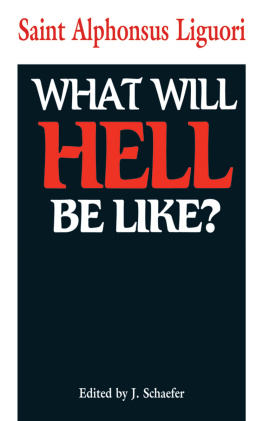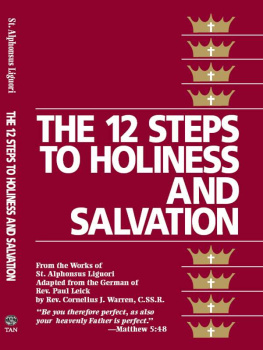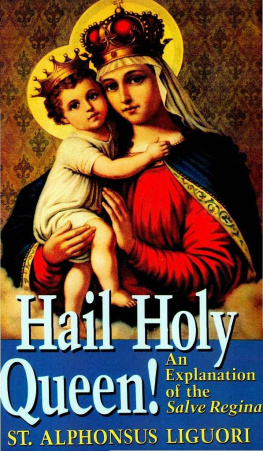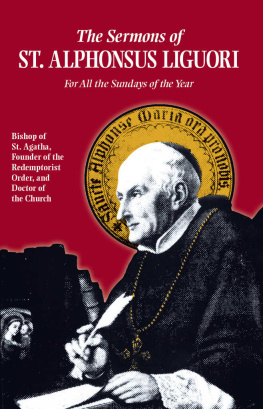St. Alphonsus Liguori - What Will Hell Be Like?
Here you can read online St. Alphonsus Liguori - What Will Hell Be Like? full text of the book (entire story) in english for free. Download pdf and epub, get meaning, cover and reviews about this ebook. year: 2009, publisher: TAN Books, genre: Religion. Description of the work, (preface) as well as reviews are available. Best literature library LitArk.com created for fans of good reading and offers a wide selection of genres:
Romance novel
Science fiction
Adventure
Detective
Science
History
Home and family
Prose
Art
Politics
Computer
Non-fiction
Religion
Business
Children
Humor
Choose a favorite category and find really read worthwhile books. Enjoy immersion in the world of imagination, feel the emotions of the characters or learn something new for yourself, make an fascinating discovery.
- Book:What Will Hell Be Like?
- Author:
- Publisher:TAN Books
- Genre:
- Year:2009
- Rating:5 / 5
- Favourites:Add to favourites
- Your mark:
- 100
- 1
- 2
- 3
- 4
- 5
What Will Hell Be Like?: summary, description and annotation
We offer to read an annotation, description, summary or preface (depends on what the author of the book "What Will Hell Be Like?" wrote himself). If you haven't found the necessary information about the book — write in the comments, we will try to find it.
What Will Hell Be Like? — read online for free the complete book (whole text) full work
Below is the text of the book, divided by pages. System saving the place of the last page read, allows you to conveniently read the book "What Will Hell Be Like?" online for free, without having to search again every time where you left off. Put a bookmark, and you can go to the page where you finished reading at any time.
Font size:
Interval:
Bookmark:
What will Hell be like?
St. Alphonsus Liguori
Imprimi Potest: John N. McCormick, C.SS.R.
Provincial, St. Louis Province
June 15, 1959
Imprimatur: Joseph E. Ritter
Archbishop of St. Louis
June 24, 1959
First published in 1959 by Liguorian Pamphlets, Redemptorist Fathers, Liguori, Missouri. Reprinted in 1983 by O.B.I. Victory Mission, Inc. by arrangement with Liguori Publications, Liguori, Missouri. Retypeset and republished in 1988 by TAN Books.
TAN Books
Charlotte, North Carolina
www.TANBooks.com
1988
And I saw a great white throne, and one sitting upon it, from whose face the earth and heaven fled away, and there was no place found for them. And I saw the dead, great and small, standing in the presence of the throne, and the books were opened, which is the book of life; and the dead were judged by those things which were written in the books, according to their works... And whosoever was not found written in the book of life, was cast into the pool of fire.
Apocalypse 20:1112, 15
Contents
.
.
.
.
.
.
.
What Will Hell Be Like?
T HOUGH many of the pagans were true atheists, considering Hell a fable invented to frighten the wicked, the more renowned of the ancient philosophers such as Socrates, Xenophon, Aristotle, Plato and others had no difficulty in admitting the existence of a future lifea Heaven where the good would be rewarded, and a Hell where the evil are to be punished. Only the most perverted of men will deny that there is a God, the Creator and Governor of all things. Such men would prefer to deny the existence of God than to face the just chastisement of their own misdeeds.
We Expect Reward or Punishment
On the one hand, men know perfectly well that God is a just rewarder of good, and at the same time they behold in the world countless wicked men who live in the midst of prosperity, while many of the virtuous live out their lives in the midst of affliction and misfortune. Hence, most people are convinced that after this mortal life, there exists another world in which vice is to be chastised and virtue rewarded as it deserves.
Teaching of Pagan Philosophers
The most famous of the pagan philosophers did not hesitate to teach that there exists in the other life a Heaven and a Hell. Xenophon and Socrates, for instance, remarked that, Rewards are in store for those who please God, and punishments for those who displease Him. The same sentiments are expressed by Plato, Plutarch and others. While I refrain from quoting passages from these philosophers, I cannot pass over in silence two beautiful passages of the great orator, Cicero. In the first, he exclaims: I wish to have no part with those who have recently begun to teach that souls die along with bodies, and that all is destroyed by death. Of far more weight with me is the authority of the ancient philosophers and of our own ancestors. They paid religious homage to the dead, and considered that their entrance into Heaven should be made easy for every good and just man. The second passage is even more to the point: Those souls, which have been soiled by the vices of this life, will take the false road which separates them from the company of the gods; on the other hand, those who have preserved themselves pure and chaste, will find easy admittance to the divinity, the source of their existence.
Belief of Pagans
Among the fables of pagan peoples, there are numerous tales which, though they are fictitious, nevertheless attest to the belief of these people in the existence of a place of punishment in the future life. For us Christians, however, this belief of ancient pagans, and their philosophers, is but a substantiating argument. For we have the word of God Himself, attesting to the existence of Hell in countless passages of Sacred Scripture.
Where Is Hell Located?
The question as to the place where Hell is situated has been a matter of conjecture among the Fathers of the Church and theologians. St. John Chrysostom, for instance, was of the opinion that it is situated outside the bounds of this universe. More commonly and with more reason, other theologians think that Hell is situated within the earth itself. Some have even gone so far as to declare that it is near the surface of the globe, basing their opinion, rather quaintly, upon the existence of many volcanic mountains such as Vesuvius, the Volcanic Isles, Mt. Etna and others.
Catholic Teaching
Aside from these debatable opinions, a group of heretics known as the Ubiquitists maintained that Hell is not restricted to any determined place, but is to be found everywhere, since God has not destined any special place for the damned. This opinion, however, is evidently false, and contrary to the common belief of the Catholic Church which teaches us that God has established a definite place for the demons and the reprobate, as is evident from several texts of Sacred Scripture. St. Jerome deduces this specifically from a passage in the book of Numbers (Num. 16:31-33). Here is described the fate of Dathan and Abiron who were precipitated into Hell, falling into a chasm which opened under their very feet. At the same time a great flame burst from the earth and killed two hundred and fifty men who were accomplices in their sin. Moreover, in many passages of Sacred Scripture, the word descend is used in reference to Hell, indicating that Hell is situated in the bowels of the earth.
Hell Is a Definite Place
This assertion is confirmed by a passage of St. Luke (16:22): But the rich man also died and was buried in hell. The sacred text employs the word buried, because burials are made within the earth. Moreover, the rich man himself describes Hell as a place of torment (Lk. 16:28), confirming the opinion that Hell is a determined and definite place. In another place it is called a lake; Thou hast saved me from those descending into the lake (Ps. 29:3); and elsewhere, a pool: And the devil who deceived them was cast into the pool of fire and brimstone. (Apoc. 20:9). It is evident, therefore, that Hell is a determined place, and most probably situated within the earth. But as to where, precisely, it is situated, whether at the very center of the earth or nearer to the surface, cannot be determined from any revealed document. St. Thomas also declared that the dimensions of Hell, which will be the dwelling place of the damned after the resurrection, cannot be determined.
Pains of Hell
Let us now treat of the pains of Hell, and first of all, of that of sense. St. Thomas proves that the fire of Hell is a corporeal and material fire, though for the most part he does not write of the fire which torments the souls separated from their bodies, but of that which the damned are to endure after their corporeal resurrection. Many heretics have maintained that the fire of Hell is not material, but only metaphorical or imaginary fire. There are numerous texts in Sacred Scripture, however, which demonstrate that the fire of Hell is a true, material and corporeal fire. We read, for instance, in the book of Deuteronomy: A fire is kindled in my wrath, and shall burn even to the lowest hell. (Deut. 32:22). And in the book of Job: A fire that is not kindled shall devour him (Job 20:26), revealing that this fire of Hell needs not to be nourished, but, once enkindled by God, burns eternally. There are a number of passages in the book of Isaias referring to this fire of Hell: Which of you can dwell with devouring fire? which of you shall dwell with everlasting burnings? (33:14); Their worm shall not die, and their fire shall not be quenched, and they shall be a loathsome sight to all flesh. (66:24). He will give fire, and worms into their flesh, that they may burn, and may feel forever. (
Next pageFont size:
Interval:
Bookmark:
Similar books «What Will Hell Be Like?»
Look at similar books to What Will Hell Be Like?. We have selected literature similar in name and meaning in the hope of providing readers with more options to find new, interesting, not yet read works.
Discussion, reviews of the book What Will Hell Be Like? and just readers' own opinions. Leave your comments, write what you think about the work, its meaning or the main characters. Specify what exactly you liked and what you didn't like, and why you think so.



![St. Alphonsus Liguori - Visits to the Blessed Sacrament (with Supplemental Reading: Novena of Holy Communions) [Illustrated]](/uploads/posts/book/269658/thumbs/st-alphonsus-liguori-visits-to-the-blessed.jpg)






![Saint Alphonsus de Liguori - The Saint Alphonsus de Liguori Collection [30 Books]](/uploads/posts/book/134324/thumbs/saint-alphonsus-de-liguori-the-saint-alphonsus-de.jpg)